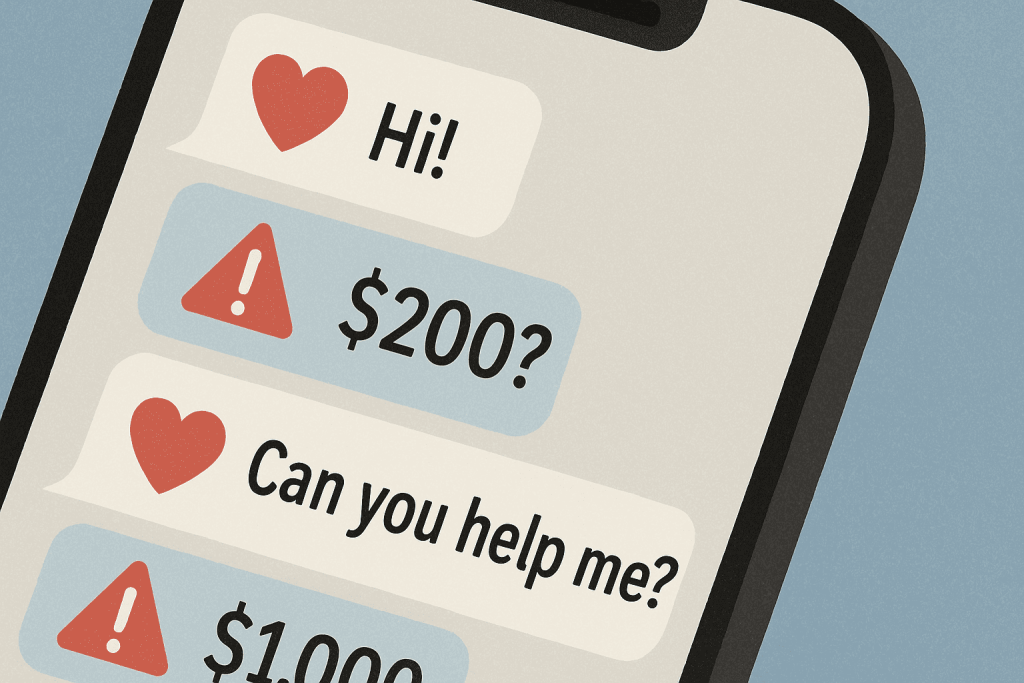It often starts with sweet messages, late-night calls, and emotional bonding. You finally feel seen until one day, they say,
“My bank card isn’t working… can you help me just this once?”
That single financial request is where many love stories turn into heartbreak. What began as romance slowly reveals hidden manipulation. Red Flags in Online Dating Everyone Should Know
In the world of online dating, scammers use emotions as currency. Understanding these financial red flags and scammer tactics can protect you from emotional and financial loss.
Understanding Financial Red Flags in Online Dating
When someone you just met online starts talking about money, pause.
Not every story is a scam but every scam begins with a story.
1. The “Emergency” Money Requests in Dating
These requests often come disguised as sudden misfortunes:
- “My mother’s surgery needs funds.”
- “My wallet was stolen during travel.”
- “I can’t access my bank account overseas.”
💡 Scammer tactic: They rely on your empathy. Once you help them once, they’ll ask again each request slightly bigger than before.
2. Gradual Financial Dependence
Not all scammers ask immediately. Some play the long game.
- They spend weeks gaining trust.
- They shower you with affection and promises.
- Then they introduce their “temporary financial problem.”
This emotional investment is designed to disarm your suspicion.
It’s not just about the money it’s about control.
3. Emotional Manipulation Disguised as Love
Scammers are excellent actors. They create urgency through emotion:
- “I thought you loved me.”
- “I wouldn’t ask if it wasn’t serious.”
- “You’re the only person I can trust.”
These are emotional hooks meant to blur logic with affection.
This is where financial red flags meet psychological manipulation.

Common Scammer Tactics Behind Financial Requests
Let’s look deeper into how scammer tactics evolve from subtle to severe.
1. Sympathy-Based Manipulation
Scammers often craft fake tragedies:
- Illness, car accidents, lost jobs, or stranded travel situations.
- Their story grows emotional layers to make you feel guilty if you don’t help.
🕵️ Reality check: Real people rarely share financial issues with someone they’ve never met in person.
2. Investment and Cryptocurrency Scams
Modern dating scams often merge romance with “business opportunities.”
They’ll say things like:
“I’ve made great profits trading crypto I can teach you too.”
You deposit a small amount, see “profits” (fake ones), and get tempted to invest more.
Once you do they vanish.
📉 Scammer tactic: They use money requests in dating under the guise of “joint investment” or “shared future.”
3. Fake Travel or Visa Stories
Many victims report being asked to fund travel expenses:
- “I want to meet you but need help booking my flight.”
- “My visa got delayed; I just need a little more to process it.”
✈️ Scammer tactic: Promise of a visit makes victims hopeful the emotional setup before the financial hit.
4. Job or Contract Scams
Scammers pretend to be working abroad on high-paying contracts (military, oil, engineering, or UN missions). They might ask:
“Can you help me clear a shipment?”
“I need temporary funds to complete a project.”
They build trust through professional storytelling polished, detailed, believable.
But the ultimate goal remains: money.
The Psychology Behind Money Requests in Dating
To truly spot these signs, you must understand how scammers think.
Emotional Anchoring
They anchor your emotions to their story.
Every compliment, confession, and late-night chat serves one purpose to make you feel responsible for their wellbeing.
The “Hero” Effect
They make you feel like their savior:
- “I’ve never trusted anyone like this.”
- “You’re my angel.”
This plays on a psychological desire to feel needed a manipulation masterpiece.
Fear of Losing Connection
Once you hesitate to help, they threaten emotional withdrawal:
“Maybe you don’t really care.”
This guilt loop makes victims comply just to restore peace.
Hidden Financial Red Flags You Might Overlook
Scammers are skilled at staying one step ahead. Here are subtle clues many ignore:
- They avoid video calls and use excuses like “bad internet.”
- They never discuss details you can verify (company, address, family).
- Their grammar or tone changes suddenly possibly multiple people texting you.
- Their stories include frequent “bad luck” moments.
💬 Remember: Love should add peace to your life, not pressure on your wallet.

How to Respond to Financial Requests in Dating
When a request for money appears even a small one treat it like a smoke alarm. Don’t panic, but don’t ignore it either.
1. Stay Calm, Don’t Accuse Immediately
Some people may genuinely need help, but never assume verify first.
2. Ask for Verification
- Suggest a video call.
- Ask specific questions about their problem.
- Observe how they react genuine people provide proof, scammers avoid it.
3. Never Send Money or Share Bank Details
Even small transactions can expose your financial information.
Scammers use emotional urgency to bypass your logic.
4. Report and Block
If you suspect foul play:
- Report their profile on the dating platform.
- Keep screenshots and message history.
- Contact IC3.gov (U.S.) or your local cybercrime cell.
Protect Yourself from Scammer Tactics
Awareness is your best defense. Here’s a quick safety checklist:
✅ Verify identities through video or voice calls.
✅ Don’t share financial details or personal documents.
✅ Reverse search their photos using Google Images.
✅ Watch for inconsistencies in their timeline or story.
✅ If it feels rushed or too emotional step back.
Trust builds through time, not transactions.
Recovering After Falling for Money Requests in Dating
If you’ve already sent money, don’t blame yourself. Scammers are experts in emotional engineering.
You can still take action:
- Report to authorities and your bank immediately.
- Reach out to emotional support groups.
- Learn from it not to close your heart, but to open your eyes.
Every story, even a painful one, can teach strength.
Real Love Doesn’t Come with a Price Tag
If affection comes with invoices, it’s not affection it’s deception.
True love never asks for your money; it asks for your presence, honesty, and time.
Recognizing financial red flags early is not about being paranoid it’s about being aware.
Stay cautious, stay kind, but most importantly stay trusted and true.
Trusted and True is the first dating platform truly dedicated to protecting you from hidden manipulation and deceitful motives. Learn to recognize the subtle signs from sudden financial requests to other quiet red flags before they cost you your trust or money.
Frequently Asked Questions (FAQs)
What are financial red flags in online dating?
They include money requests, vague financial emergencies, or promises of investment opportunities that require your funds.
Why do scammers use emotional tactics for money requests?
Scammers build emotional trust to lower your defenses. When affection feels real, it’s easier to manipulate decisions.











